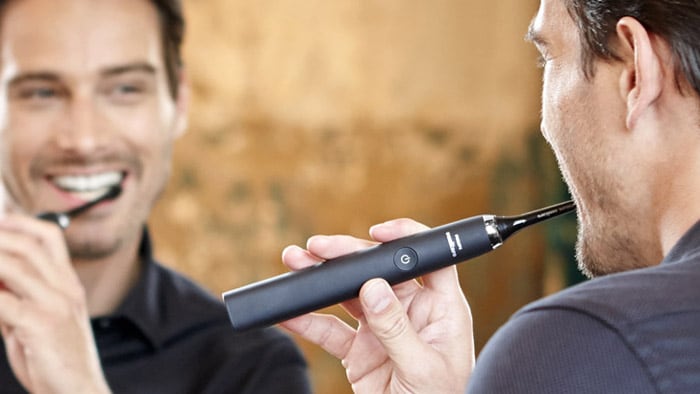
How Long Should You Brush Your Teeth & Other FAQs

Learning how to improve dental health at home is crucial not only for achieving a confident smile but also for maintaining the long-term health of your teeth and gums. Good oral hygiene is essential for preventing common dental issues such as cavities, gum disease, and bad breath. By incorporating a few simple yet effective habits into your daily routine, you can easily learn how to care for your teeth – and maintain their health.
In this article, we will share tips for healthy teeth and gums and provide guidance on how to have better oral hygiene.
A consistent oral hygiene routine is key if you want to know how to improve oral hygiene and avoid common dental problems. To brush your teeth properly, you should use a soft-bristled toothbrush and suitable toothpaste. Make sure you’re brushing your teeth for at least two minutes and that you’re covering all surfaces of your teeth, including the fronts, backs, and chewing surfaces. Remember, don’t forget to gently brush your tongue as well to remove bacteria and freshen your breath! For optimal results, consider using an electric toothbrush, such as the Philips Sonicare DiamondClean Prestige. This toothbrush uses sonic technology to provide a deeper clean, removing more plaque than a manual brush. Plus, it comes with several brushing modes to meet individual needs and preferences, allowing you to tailor your brushing experience. The different modes ensure you stick to the 2-minute minimum, covering all areas, and it includes a pressure sensor to protect your gums from excessive force. Wondering how to have better oral hygiene? As important as it is, brushing alone isn’t enough to maintain complete oral health. Flossing is equally important for removing food particles and plaque between your teeth, where a toothbrush might not reach. Floss at least once a day, preferably before bedtime, to remove stubborn particles and prevent gum disease. After flossing, consider using mouthwash to rinse away bacteria and freshen your breath. Choose a mouthwash that is alcohol-free and contains fluoride to help protect against cavities and gum disease.2
The first and most important step to take when learning how to improve dental health is brushing your teeth twice a day. Brushing removes plaque and food particles that accumulate in your mouth throughout the day, preventing cavities and gum disease.1
If you’re looking to understand how to improve dental health at home, your diet is one area to consider as what you eat can affect your overall oral hygiene. Here are a few essential oral hygiene tips to ensure a healthy smile:
No matter how diligently you brush and floss, it's still important to visit your dentist regularly for professional cleanings and check-ups. Aim for at least two visits per year to keep your teeth and gums in top shape. Your dentist will check for early signs of tooth decay or gum disease and provide oral hygiene tips to help you avoid major issues later. Professional cleaning removes tartar and plaque build-up that can’t be removed with regular brushing and flossing.
When you’re learning how to improve oral hygiene or how to care for your teeth, it’s important that you have the best tools in your arsenal. The right toothbrush that is tailored to your needs can have a great impact on your oral microbiome. For example, the Philips Sonicare DiamondClean Prestige is the ideal toothbrush for those looking for a high-tech solution to their oral care needs. With sonic technology, it removes more plaque and offers multiple brushing modes for a customised clean.
Additionally, to maintain optimal dental health, it’s also important to replace your brush head regularly – approximately every 3 months. Fortunately, Philips makes it easy to adjust your brush heads to suit your needs, whether it’s gum care, plaque removal, sensitive teeth, or an all-in-one option. And if you’re focused on sustainability in your hygiene routine, Philips Sonicare brush heads are eco-friendly and come with paper-based packaging, so you can achieve a cleaner smile while being kind to the planet.
To keep your teeth and gums healthy, here’s a quick summary of ways to improve your dental health:
By following these simple steps, you now know how to improve your oral hygiene, and you can ensure that your smile stays healthy and bright for years to come!
Series 7100
Rechargeable toothbrush
HX7429/02